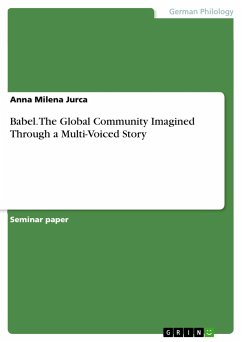Seminar paper from the year 2007 in the subject German Studies - Miscellaneous, grade: A, Georgetown University (German Department), course: Theorizing Culture, language: English, abstract: While the structure of narration used in the 19th and early 20th century to imagine a national community and to create an identity was one characterized by linearity, chronology, and homogeneity, current mass culture is engaged in the search for other ways to shape the idea of a now global community. This paper analyzes the movie Babel that exemplifies the way cinema art can deconstruct the traditional linearity in time and place of its narration and replace it with a fragmented and network-like set of stories. This shift is most visible and developed in the American cinema (Pulp Fiction, Go, 21 Gram, City of God, Amores Perros, Crash, Sin City, Magnolia, Memento, Donnie Darko), but also increasingly appears in European productions (One Day in Europe). Considering the worldwide effects of globalization and mass culture that attempts to deal with global impacts on society, politics, and cultures, it is more important to acknowledge that this shift is occurring in Western culture than stressing whether a particular movie was produced in Europe or the Americas. I argue that this emergence of fragmented network stories can be seen as evidence of mainstream culture concerned with and carrying on the effects of globalization on human relations. After exposing how the traditional linear cinematic narration is replaced by a network of fragments of stories and time pieces, I will argue that the connection of mainstream culture with this new type of narrativity is a representation of the economic and political struggles at a global scale. Furthermore, I will display how culture, previously attempted to create an image of the nation by narrating linear stories, now creates the master-narration of a global community and how this can be used as a tool to critique world politics.








